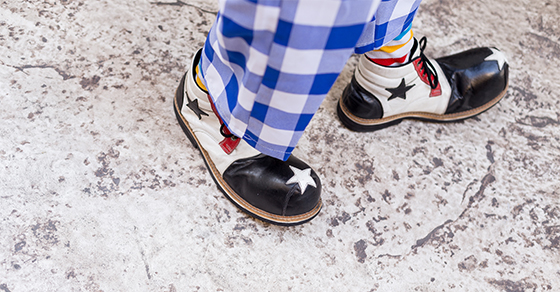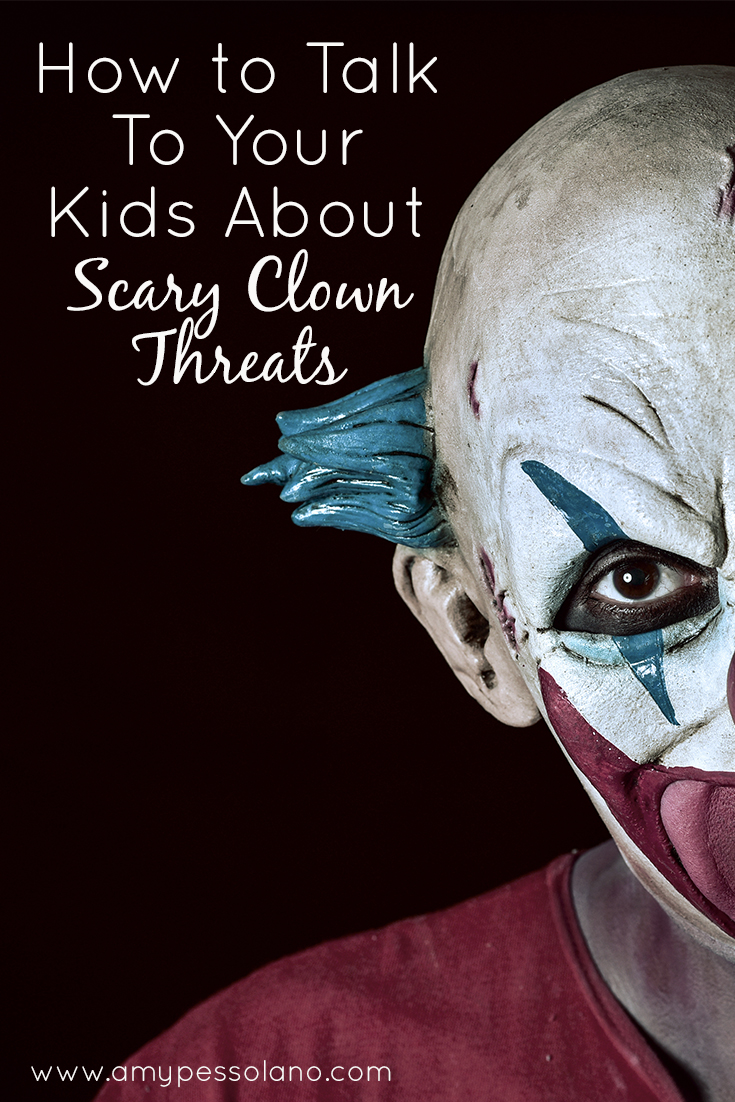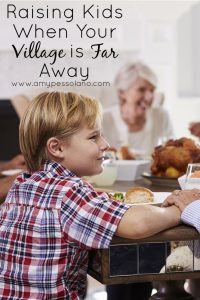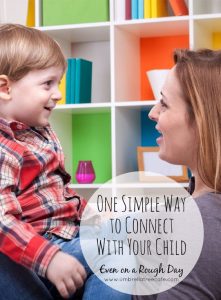I received a sample of this product in exchange for my review. However, I only recommend products or services I love, that I use personally and believe will be good for my readers. The links to Amazon in this post are affiliate links and I will be compensated if you make a purchase using them.
When I first heard the story about scary clowns coming out of the woods to chase kids in South Carolina I admit I didn’t give it much thought. It was August. It was one incident in another state. My kids aren’t often outside by themselves anyway. Nothing to worry about.
But then more and more stories hit my newsfeed.
And they started getting closer and closer to our area.
First Toms River (about 2 hours), then Philadelphia (1.5 hours), and even Washington Township (45 minutes)… They had morphed from actual sightings of scary clowns to threats of scary clowns made against schools.

A tiny little thought started nagging in my brain… maybe I should mention the scary clowns to the kids. You know, just incase they happen to see one lurking near our house when they are in the yard or even in the trees outside the school when they are on the playground. Just incase. They should be prepared.
One night as we were finishing up dinner I told them, if they ever see a clown to run to the house. Not to talk to it or do anything but ignore it and run to get me or a teacher.
Then my husband chimed in to emphasize it’s importance in his intense, this is urgent and scary voice, and my 4 year old broke down into tears. My already anxious 6 year old wouldn’t stop talking about it. They were both afraid to go upstairs to bed. Ooops!
So how do you draw the line between preparing your kids and scaring the crap out of them?
That’s the tricky part.
I spoke with Nicole Schwarz, MA, LMFT, Parent Coach and owner of Imperfect Families.com who said your response depends on your child.
She says, “For older, savvy kids who probably know what’s going on, bring up the topic, listen for their take on it and ask if they have any questions.”
I love this idea of leading with finding out what your kids already know. Asking questions and listening goes a long way with kids and they’ll be more responsive to your guidance if it’s a conversation, rather than a lecture.
It’s Not Really About the Clowns
When we first brought up the topic of scary clowns with our boys, the situation seemed hypothetical. I only wanted to let them know that if they saw something suspicious, like a clown, to tell an adult. Up until this point, we haven’t had many safety talks with the kids so we’re a little rusty in the family preparedness department. I’ve always been an arms length away, so we didn’t make the extra effort to discuss safety more than in passing. Bad idea.
I am learning that it’s better to be prepared to ease everyone’s anxiety, especially mine.
So we’ve started having more conversations about safety, and it helps that they practice emergency drills, like evacuations for fire and lockdowns at school.
I’ll be exploring this topic of discussing safety with school age kids, especially if they’re prone to anxiety, more in the coming months. Want to be the first to know how we’re handling these discussions?
What to Say if Younger Kids Have Concerns
Nicole says, “If your child is younger, and maybe just saw an image of a scary clown but doesn’t know the story behind it, use age appropriate language to give some basic facts. Emphasize that they are safe (parents, police, etc.) Ask if they have any questions and let them know you are always willing to listen if they have questions later.”
Have regular safety discussions about being observant, telling an adult if they have concerns, and looking out for tricky people. Talk to them about what to do if they are lost in public.
Know what to do if you’re in an active shooter situation.
If safety talks are part of your regular dinner time discussions, they won’t be as scary and kids will be more receptive. The kids are already practicing fire and lockdown drills at school. In fact, 2 years ago, my then preschooler had a 2 hour lockdown when threats were called into the administration building and I had no idea what to do. So it helps to prepare yourself with a plan too. (more on lockdown drills coming soon)
The Clown Threat Gets Close to Home
Since that initial discussion, remember, the one where we accidentally scared our kids, the clown threats seemed to be everywhere. The students at my alma mater (Penn State) and other colleges across the nation had clown hunts, where students flooded the streets with baseball bats looking for phantom clowns.
Then the letter came home in my preschooler’s folder that 2 students at our high school reported threats on their personal mobile devices.
Turns out, my first grader and his friends have also been talking about the clowns in class and he told me he heard they were at the high school even before the letter came home. So it turns out, our preemptive discussion helped ease his worries a bit. He felt “in the know”.
Our school had similar advice to Nicole.
- Talk to your kids using age appropriate language.
- Assure them they are safe. Our police and security guards have a strong presence in our schools already, so that helps.
- Reiterate to older kids the importance of not using social media to spread rumors or join in on the pranks by dressing in clown costumes, for their own safety.
After we scared them, we told them to think about what they want for Christmas to keep their minds off of their fears so they could get to sleep. That seemed to help. In the days following that talk, we followed up our initial discussion with more details and reminded the kids that all clowns aren’t scary, but people are dressing up like clowns as a scary prank. We want them to be safe, so if they see a clown, to come tell an adult.
I wish we didn’t have to talk to young kids about such scary things. At this age, we need to tell them just enough to keep them safe and prepared, but not enough to scare them. In today’s world, a little preparation goes a long way. Sadly, we can’t afford to stick our heads in the sand and pretend bad things and emergency situations don’t happen.
But we can talk to our kids calmly, in age appropriate ways, so they are prepared without being afraid and anxious.
How do you talk to your kids about safety? I’d love to hear your thoughts in the comments.
Read more about scary clowns in the news:
- How to talk to your kids about scary clowns- Oregon Live
- Killer Clown threats on social media, what Parents should tell their kids- NJ.com
- What’s with clowns everywhere? 6 Legit Possibilities- Cnn
- Scary clown rumors, threats, feed hysteria, leading to school lockdowns, arrests
More Parenting Tips:




Just one more scary thing to have to talk to our kids about this season! What in the heck is next?!